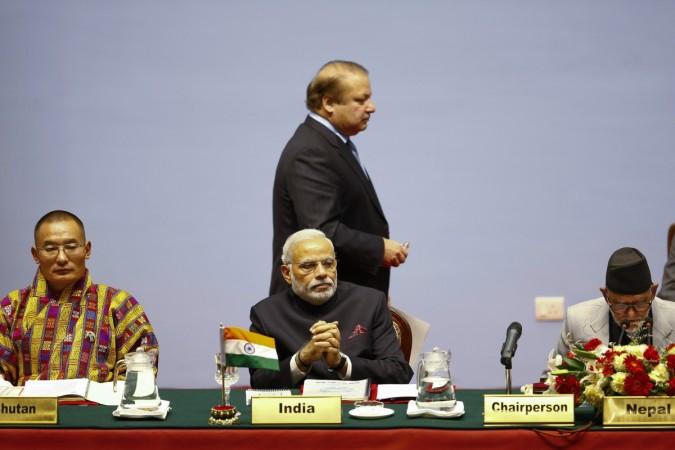
In what was seen as a setback to regional cooperation and the ongoing SAARC summit here, Pakistan on Wednesday blocked three proposed regional agreements related to motor vehicles, rail connectivity and a framework agreement on energy cooperation, pushed by India and other member states.
This means there will be no pacts and agreements during the 18th South Asian Association Regional Cooperation Summit, if no decisions are taken Thursday in a leaders' retreat at a hill resort near Kathmandu where the heads of state and government will informally mingle with each other.
"Pakistan has voiced some differences over three pacts to be prepared for signing during the summit," Khagnath Adhikari, spokesperson of Nepal's foreign ministry, told IANS.
"Our last ditch efforts until Thursday will continue. We are at least trying to have the energy related pact signed in the summit."
The SAARC Secretariat had forwarded the drafts of the proposed pacts to all member states and initially they had given nod to them.
After receiving green signals from all member states, the Nepal government had announced here that three pacts will be signed during the summit. But, all of sudden, Pakistan voiced reservation over all three pacts since the meeting of programming committee in meetings at joint secretary, foreign secretary and SAARC foreign ministers' levels.
After Pakistan's cold shoulder to the three pacts, the meeting of SAARC foreign ministers was extended till Tuesday midnight with several rounds of official and unofficial talks but no understanding could be reached.
Adhikari said that Pakistani officials now saying that they have to get consent from the country's four provinces and without having approval from these provinces, it would be difficult for them to go ahead with the pacts.
The proposed motor vehicle and rail pacts aim to allow vehicles to ply in member states with both cargo and passengers subject to various terms and conditions. The agreement, once signed, will result in closer regional economic cooperation and integration through enhanced regional connectivity by allowing movement of goods and people in the region by road.
The railway pact also aims to strengthen transport connectivity in the region and offers greater scope of promoting social and cultural contact and encourage tourism. The agreement also enables low-cost efficient and environment friendlytransportation in the region and provides trade and economic links for landlocked and semi-isolated regions.
The framework agreement in the field of energy also aims to enable greater cooperation in the power sector among the member countries and is expected to improve power availability in the entire region and facilitate integrated operation of the regional power grid.
"We do not see much problem in energy pact with minor amendment," Adhikari said, but added that "we are in fix whether they (Pakistan) will approve the amended pact or not".
"Other member states and their cabinets have approved the pacts but Pakistan is not sure whether it can do it now or seek cabinet approval again," he said.
All these pacts need cabinet approval from the member states. If one country opposes, it cannot be signed as an agreement or put it in the Kathmandu Declaration as all SAARC decisions are taken by consensus.
"But our efforts are on to find an agreement during the retreat Thursday on the framework agreement in energy sector," Adhikari said.















